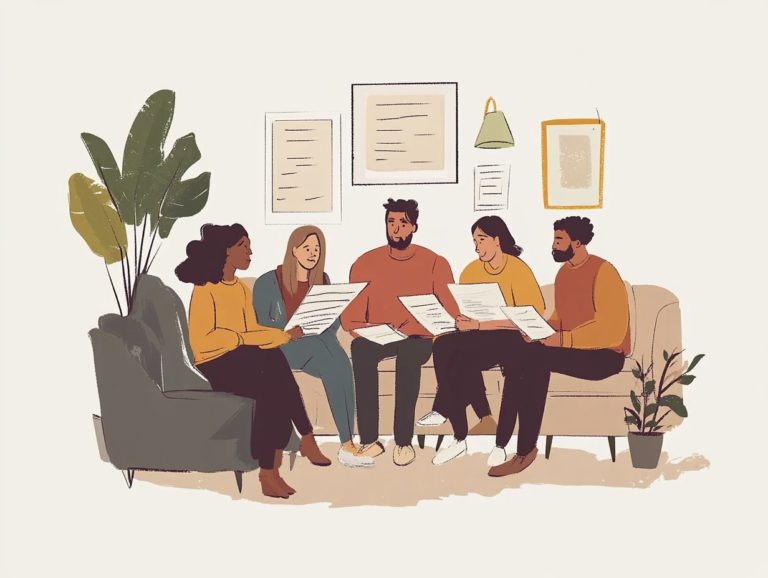5 Essential Steps for First-Time Home Buyers
Buying your first home is an exhilarating journey, but it can also be quite intimidating. With countless decisions on your plate, it s perfectly normal to feel a bit overwhelmed.
This guide is designed to illuminate the essential steps for navigating the home-buying process with confidence. You’ll explore everything from establishing your budget and getting pre-approved for a mortgage to discovering the ideal neighborhood and steering clear of common pitfalls.
Whether you’re envisioning a charming starter home or a roomy family retreat, these insights will give you the power to make bold choices at every stage of your journey.
Contents
- Key Takeaways:
- 1. Determine Your Budget
- 2. Make a List of Must-Haves
- 3. Research Neighborhoods
- 4. Attend Open Houses and Schedule Private Showings
- 5. Make an Offer and Close on Your Dream Home
- What Are Some Common Mistakes First-Time Home Buyers Make?
- Frequently Asked Questions
- What are the 5 essential steps for first-time home buyers?
- Why is it important to determine my budget before starting the home buying process?
- What should I look for when researching and choosing a location and type of home?
- How can a real estate agent help me as a first-time home buyer?
- What are some tips for making an offer and negotiating for the best deal?
- What should I expect during the closing process?
Key Takeaways:

- Determine your budget and get pre-approved for a mortgage.
- Make a list of must-haves and nice-to-haves to guide your home search.
- Research neighborhoods and find a trusted real estate agent to help you.
1. Determine Your Budget
Knowing your budget and getting pre-approved for a mortgage are crucial first steps. They ensure you’re ready to make a significant property investment, and understanding how agents can help first-time home buyers can further streamline the process.
Check your credit score, as it shows your creditworthiness. Also, look at how much of your income goes to existing debts. Be aware that down payment requirements can vary based on loan types.
Getting pre-approved makes your journey smoother and more exciting! It clarifies how much a lender is willing to extend, giving you a clear understanding of your budget.
2. Make a List of Must-Haves
Make a list of what you need versus what you want in a home. This will help you focus on what truly matters.
Consider location, the number of bedrooms, and outdoor space. These factors affect your long-term happiness.
It s essential to distinguish between the essentials like proximity to work and good schools and preferences, like a gourmet kitchen.
3. Research Neighborhoods
Research neighborhoods and choose the right real estate agent. This decision can shape your living experience.
Look into safety, school quality, and access to amenities. A good agent can help you find a community that meets your needs and future aspirations.
4. Attend Open Houses and Schedule Private Showings

Attending open houses and private showings is essential for first-time homebuyers. These experiences help you assess homes in a way that photos can’t, and it’s also important to consider the 5 steps to take before applying for a mortgage to ensure you’re well-prepared.
During open houses, enjoy the neighborhood’s atmosphere. Listen to the sounds and notice the nearby amenities.
Private showings give you a close look at the property. Check details like fixtures and any necessary renovations.
Ask sellers and agents questions to learn about the property’s history. Being prepared can reveal important insights.
5. Make an Offer and Close on Your Dream Home
Making an offer and closing on your dream home is an important step in the home buying process. Effective negotiation with the seller and understanding closing costs can significantly impact your experience and financial outcome.
Before negotiating, research comparable sales in the area. This will help you determine a fair price for the property. Also, consider the home’s condition; repairs may justify a lower offer.
When it’s time to negotiate, present a well-reasoned offer backed by market analysis. Including earnest money shows your commitment and enhances your chances of a favorable agreement.
What Are Some Common Mistakes First-Time Home Buyers Make?
First-time homebuyers often stumble over common mistakes during the buying process. To avoid these pitfalls, it’s crucial to follow 5 steps to a successful home purchase, which include adequate budgeting, calculating mortgage options accurately, and ensuring essential inspections are completed to prevent unforeseen complications.
To navigate this journey effectively, assess your financial situation and create a comprehensive budget. This should include the mortgage, property taxes, insurance, and potential maintenance costs.
Many individuals underestimate the importance of getting pre-approved for a mortgage. This step enhances your negotiating power and clarifies your price range.
Never skip essential steps like home inspections. These can identify significant repairs before closing the sale.
By prioritizing these considerations, you can make informed decisions and enjoy a smoother home buying experience, especially with 5 tips for first-time home buyer grants.
How Can First-Time Home Buyers Prepare for the Closing Process?
Preparing for the closing process is crucial for first-time homebuyers. This phase involves understanding closing costs, securing home insurance, and reviewing 5 essential tips for home financing to ensure all necessary documents are ready for a smooth transition into homeownership.
A well-organized approach can elevate this critical stage of your home-buying journey. Start by gathering essential documents like tax returns, bank statements, and pay stubs, as these are often needed by lenders to verify your financial stability. Following the steps to secure a first-time home buyer loan will also help streamline the process.
Coordinate closely with lenders to maintain timely communication and address any issues. Carefully review closing disclosures; these documents detail all associated costs and obligations.
Being proactive about closing costs can save you money. Additionally, take the time to shop around for home insurance to find the best coverage options at competitive rates.
What Are the Benefits of Working with a Real Estate Agent?

A knowledgeable real estate agent offers many benefits for first-time homebuyers, including tips for first-time home buyer negotiations and expert guidance throughout the buying process.
Their expertise helps you navigate the local market’s complexities. They can also help you identify properties that match your preferences and budget.
An experienced agent skillfully handles negotiations. They ensure you secure favorable terms that might slip through the cracks in the excitement of house hunting.
The support also includes managing the paperwork involved in real estate transactions. This saves you valuable time and alleviates the stress often associated with closing a deal.
This comprehensive support streamlines your entire buying experience. It transforms it into a more enjoyable and less overwhelming journey.
How Can First-Time Home Buyers Negotiate for a Better Price?
As a first-time homebuyer, you can negotiate a better price by conducting market research. Understand the seller’s motivations and craft a well-prepared offer that reflects the property’s value.
By evaluating comparable sales in your area, you can identify a fair price. This strengthens your bargaining position.
Keep a close watch on current market conditions to make informed decisions. This is especially important during buyer’s or seller’s markets.
Don’t overlook the potential for seller concessions. Asking for help with closing costs or requesting repairs can lead to substantial savings.
Building a genuine rapport with sellers through authentic conversation promotes a positive atmosphere. This strategy can lead to better negotiation results!
What Are Some Hidden Costs of Buying a Home?
When you re buying a home, it s crucial to be aware of various hidden costs. These can significantly affect your overall budget.
Closing costs, property taxes, and ongoing maintenance expenses can add up quickly. To avoid unexpected financial strain, factor in these initial costs.
Consider additional expenses like inspection fees. These can uncover potential issues with the property, and appraisal costs are necessary for securing your mortgage.
Homeowners association (HOA) fees often catch buyers off guard. They play a role in community upkeep and amenities.
By establishing a comprehensive budget that includes these often-overlooked expenses, you can better protect yourself from surprises. This will help you make informed financial decisions throughout the buying process.
How Can First-Time Home Buyers Avoid Overpaying for a Home?
To avoid overpaying for a home, it’s essential for first-time homebuyers to conduct thorough research. Comparing home values in the area is crucial, and understanding the 5 key features of a first home can help ensure appraisals are carried out before finalizing any offers.
Collaborating closely with knowledgeable real estate agents can be a game changer. They offer insights into pricing trends and unique property features that might not be immediately obvious.
Utilizing various online valuation tools provides a broad perspective on property prices. This helps you identify competitive listings.
Equally important is your familiarity with current market trends. This knowledge can reveal whether properties are appreciating or depreciating in value.
A well-conducted appraisal serves as a reliable safety net. It ensures that you re well-informed and protected against the risk of overpaying in a fluctuating market.
Frequently Asked Questions

What are the 5 essential steps for first-time home buyers?
- Determine your budget and get pre-approved for a mortgage.
- Research and choose the right location and type of home.
- Hire a trusted real estate agent.
- Make an offer and negotiate for the best deal.
- Complete the necessary paperwork and close the deal.
Why is it important to determine my budget before starting the home buying process?
Determining your budget is crucial because it helps you understand what you can afford. This also narrows your search and saves time by focusing only on homes within your price range.
What should I look for when researching and choosing a location and type of home?
Consider factors like the area, school district, and how close you are to work and amenities. Think about your needs, such as the number of bedrooms and bathrooms, as well as any features you want.
How can a real estate agent help me as a first-time home buyer?
A real estate agent is your best ally in navigating this exciting journey! They know the market, can negotiate better deals, and handle all the paperwork and legal matters.
What are some tips for making an offer and negotiating for the best deal?
To make a strong offer and negotiate effectively:
- Do your market research first.
- Make a reasonable offer based on your budget and the home s condition.
- Be ready to discuss price and terms openly with the seller.
What should I expect during the closing process?
The closing process is when you finalize your home purchase. You’ll sign important paperwork and pay necessary fees, usually at a title company or attorney’s office. You may also do a final walkthrough of your new home.






